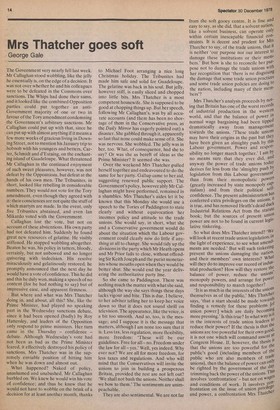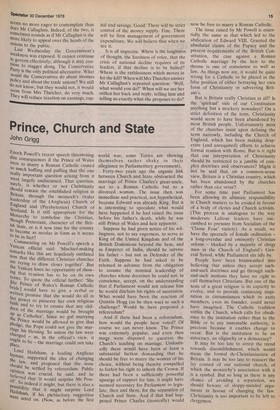Mrs Thatcher goes soft
George Gale
The Government very nearly fell last week. Mr Callaghan stood wobbling, like the jelly he essentially is, on the edge of a decision. It was not over whether he and his colleagues were to be defeated in the Commons over sanctions. The Whips had done their sums, and it looked like the combined Opposition parties could put together an antiGovernment majority of one or two in -favour of the Tory amendment condemning the Government's arbitrary sanctions. Mr Callaghan could put up with that, since he can put up with almost anything if it means a few more weeks of gracious living in Downing Street, not to mention his January trip to hobnob with his youngers and betters, Carter, Schmidt and d'Estaing, on the enchanting island of Guadeloupe. What threatened Mr Callaghan in the continued enjoyment of such sweet pleasures, however, was not defeat by the Oppositions, but defeat at the , hands of his own men. The Tribunites, in short, looked like rebelling in considerable numbers. They would not vote for the Tory amendment, even though they agreed with it: their consciences are not quite the stuff of which martyrs are made. In the event, only five Tribunites abstained, and even Ian Mikardo voted with the Government.
Callaghan lost the vote, but not on account of these abstentions. His own party had not defeated him. Suddenly he found great new resources of gelatine. He visibly stiffened. He stopped wobbling altogether. Beaten he was, his policy in tatters, bloody, certainly, but not unbowed and no longer quivering with indecision. His resolve miraculously and gelatinously restored, he promptly announced that the next day he would have a vote of confidence. This he did and this he duly won, making a speech of no content (for he had nothing to say) but of impressive ease, and apparent firmness.
But where and what was Mrs Thatcher doing in, and about, all this? She, like the Prime Minister, had played no speaking part in the Wednesday sanctions debate, since it had been opened (badly) by Roy Hattersley, and leaders of the Opposition only respond to prime ministers. Her turn came in the Thursday — confidence — debate. Although Wednesday's vote had not been as bad as the Prime Minister feared, it effectively destroyed his policy of sanctions. Mrs Thatcher was in the supremely enviable position of hitting him when he was down and almost out.
What happened? Naked of policy, unashamed and unabashed, Mr Callaghan burbled on. We knew he would win his vote of confidence; and thus he knew that he would not have to wobble on the brink of a decision for at least another month, thanks to Michael Foot arranging a nice long Christmas holiday. The Tribunites had made him safe and solid for Guadeloupe. The gelatine was back in his soul. But jelly, however stiff, is easily sliced and chopped into little bits. Mrs Thatcher is a most competent housewife. She is supposed to be good at chopping things up. But her speech, following Mr Callaghan's, was by all accurate accounts (and there has been no shortage of them in the Conservative press, as the Daily Mirror has eagerly pointed out) a disaster. She gabbled through it, apparently so fast that none could make sense of it. She was nervous. She wobbled. The jelly was in her, too. What, of consequence, had she to say? Or was she as bereft of ideas as the Prime Minister? It seemed she was.
Over the weekend Mrs Thatcher pulled herself together and endeavoured to do the same for her party. Gallup came to her aid, suggesting renewed public support. The Government's policy, however ably Mr Callaghan might have performed, remained in a shambles. Mrs Thatcher's aides let it be known that this Monday she would use a speech to the Tories of Paddington to state clearly and without equivocation her incomes policy and attitude to the trade unions. She would say, in short, what she and a Conservative government would do about the situation which the Labour government could clearly now do little if anything at all to change. She would tidy up the divisions in the party which Mr Heath opens and Mr Prior fails to close, without offending Sir Keith Joseph and the purist monetarists whose mouths open when they would be better shut. She would end the year delivering the authoritative party line.
So she came to Paddington. There was nothing much the matter with what she said, although the way she says things these days lacks vigour and bite. This is due, I believe, to her adviser telling her to keep her voice down so that it does not sound shrill on television. The appearance, like the voice, is a bit too smooth. And so, too, is the message; and I suppose it is the message that matters, although I am none too sure that it is. Less tax, less regulation, more flexibility, more freedom: 'These will be our guidelines. Free for all — no. Freedom under the law for all — yes.' Well, yes indeed. Why ever not? We are all for more freedom, for less taxes and regulations. And who will mind that the Conservatives will invite the unions to join in building a prosperous Britain, provided the rest are not left out? 'We shall not bash the unions. Neither shall we bow to them.' The sentiments are unimpeachable.
They are also sentimental. We are not far from the soft gooey centre. It is fine and easy to say, as she did, that a solvent nation, like a solvent business, can operate only within certain inescapable financial constraints. It is decent and prudent for Mrs Thatcher to say, of the trade unions, that it is neither 'our purpose nor our interest to damage these institutions or their mem' bers.' But how is she to reconcile her put' pose not to damage the trade unions with her recognition that 'there is no disguising the damage that some trade union practices and some trade union policies are doing to the nation, including many of their meinbers'?
Mrs Thatcher's analysis proceeds by rioting that Britain has one of the worst records of industrial production in the western world, and that the balance of power in normal wage bargaining had been tipPed dramatically away from management towards the unions. 'These trade unions may have their origins in the past but they have been given an almighty push by this Labour government. Power and responsibility no longer march together.' I am Ill; no means sure that they ever did, and anyway the power of trade unions today derives far less from the 'almighty push by, legislation from this Labour government than from their monopolistic powers (greatly increased by state monopoly caPitalism) and from their political self" confidence. The present administration ha.s conferred extra privileges on the unions, d is true, and has removed Heath's dead dna Industrial Relations Act from the statute book; but the sources of present union power are not to be found in current legislative tinkering. So what does Mrs Thatcher intend? 'we will look at recent trade union legislation, id the light of experience, to see what amefld. ments are needed.' But will such tinkenng prevent the unions damaging the natiofl. and their members' own interests? What will they do to improve our record of industrial production? How will they restore the, balance of power, reduce the unions monopoly powers, and arrange for power and responsibility to march together? 'It is as much in the interests of the unto° themselves as of the public,' Mrs Thatcher says, 'that a start should be made towards, finding a remedy for these problems .[°' union power] which are daily beconitq more pressing.' Is this true? In what way 'sit in the interests of trade union leaders t° reduce their power? If the thesis is that the unions are too powerful for their own go°c1: it is not one which will command assent d,` Congress House. If, however, the thesis is that the unions are too powerful for the public's good (including members of rile public who are also members of trade unions), then the balance of power can onlY be righted by the government of the day trimming back the power of the unions. This involves 'confrontation' — but not on wages and conditions of work. It involves con' frontation on the issue of union privilege and power, a confrontation Mrs Thatcher seems no more eager to contemplate than does Mr Callaghan. Indeed, of the two, it sometimes sounds as if Mr Callaghan is the more likely to appeal over the heads of the unions to the public. Last Wednesday the Government's weakness was exposed. It cannot continue to govern effectively; although it may continue to stagger along. The Conservative Party is the only political alternative. What would the Conservatives do about incomes Policy and about the trade unions? We still do not know; but they would not, it would seem from Mrs Thatcher, do very much. They will reduce taxation on earnings, cap ital and savings. Good. There will be strict control of the money supply. Fine. There will be firm management of government expenditure. We will believe that when we see it.
It is all imprecise. Where is the toughness of thought, the hardness of voice, that the crisis of national decline requires of its leaders, if that decline is to be halted? Where is the ruthlessness which moves in for the kill? When will Mrs Thatcher answer Mr Callaghan's repeated question: 'Well, what would you do?' When will we see her stiffen her back and reply, telling him and telling us exactly what she proposes to do?























































 Previous page
Previous page